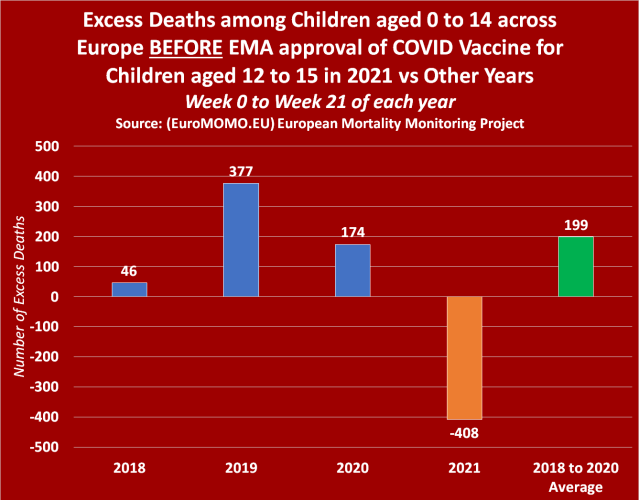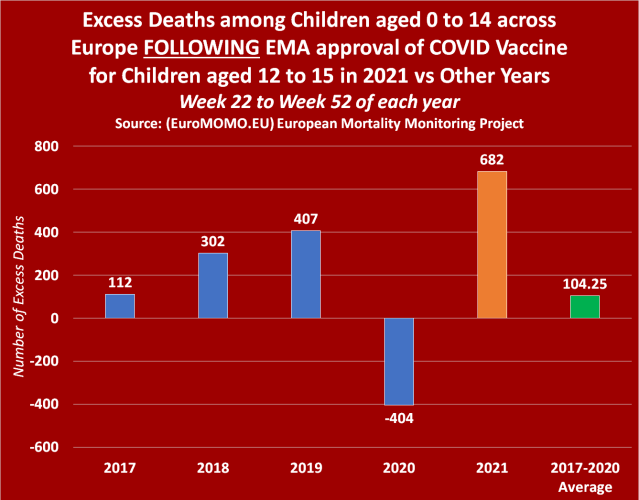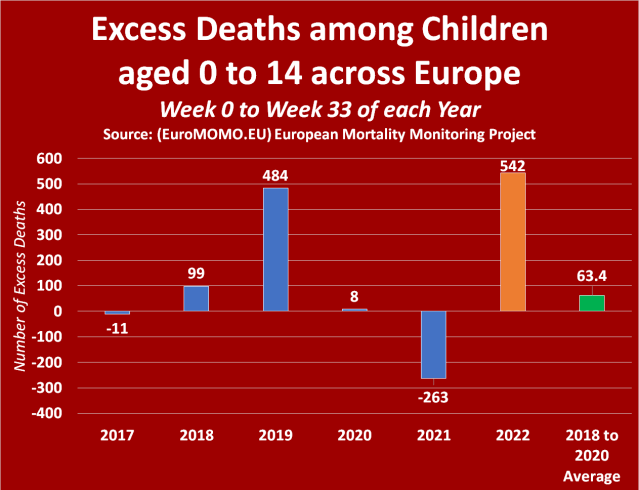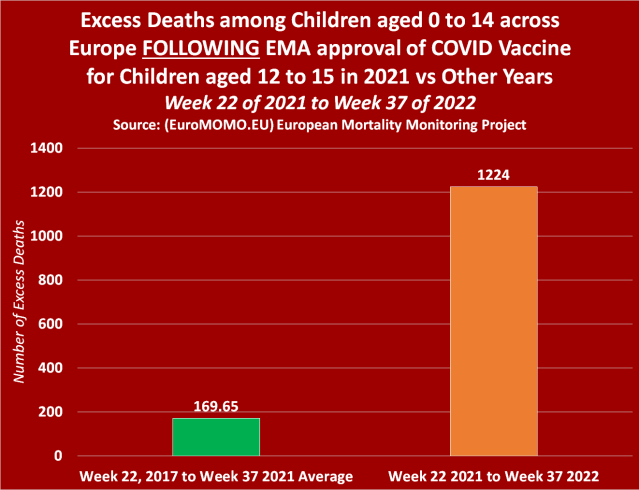Europe suffers horrifying 755% increase in Excess Deaths among Children since EMA approved COVID Vaccine for Kids
At the end of August, we exclusively revealed that official mortality figures for Europe showed a shocking 691% increase in excess deaths among children up to week 33 of 2022 since the European Medicines Agency extended the emergency use authorisation of the Pfizer Covid-19 vaccine for use in children aged 12 to 15 in May 2021.
Our investigation has since forced the European Union’s official statistics department to begin a Europe-wide investigation into why there has been a significant increase in excess deaths among children aged 0 to 14.
However, upon announcing the investigation, EuroMOMO, the organisation that published the figures, altered the baseline by which excess deaths are measured against. This questionable act resulted in the number of excess deaths being artificially reduced.
So we have revisited the data, and despite EuroMOMO’s best efforts to reduce the severity of the situation we uncovered, we can exclusivly reveal that the altered figures show there has been a shocking 755% increase in excess deaths among children aged 0 to 14 in 2022 so far, and a 630% increase overall since the EMA first approved the Covid-19 vaccine for children.
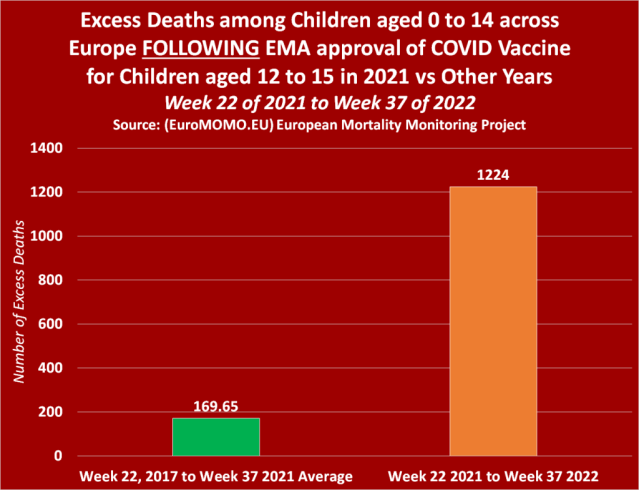
EuroMOMO is a European mortality monitoring activity. The organisation states that its aim is to “detect and measure excess deaths related to seasonal influenza, pandemics and other public health threats”.
Official national mortality statistics are provided weekly from the 29 European countries or subnational regions in the EuroMOMO collaborative network, supported by the European Centre for Disease Prevention and Control (ECDC) and the World Health Organization (WHO), and hosted by Statens Serum Institut, Denmark.
The following chart shows the weekly excess deaths throughout 2020 and 2021 among children aged 0 to 14 across Europe. The graph has been taken from the EuroMOMO website and can be accessed here.
As you can see from the above, deaths among children throughout 2020 were generally below the expected number of deaths. This trend continued throughout 2021 up to week 22, at which point excess deaths were recorded week on week until the end of the year.
What’s interesting about the fact excess deaths began to be recorded among children in week 22 of 2021 is that it coincides with the week the European Medicines Agency (EMA) granted “an extension of indication for the COVID-19 vaccine Comirnaty (Pfizer) to include use in children aged 12 to 15″.
The following chart shows the cumulative totals of weekly excess deaths between 2017 and 2022 among children aged 0 to 14 across Europe between week 0 and week 21. The data has been extracted from the EuroMOMO website and can be accessed here.
The 2018 to 2020 average number of excess deaths among children across Europe between week 1 and week 21 equates to 199. But during the first 21 weeks of 2021, there were actually 408 fewer deaths among children than expected and 607 fewer deaths than the 2018 to 2020 average.
The following chart shows the total number of excess deaths among children aged 0 to 14 in 2021 following EMA approval of the Covid-19 vaccine for 12 to 15-year-olds in week 22, compared to the same time frame in other years. The numbers have been extracted from the EuroMOMO website and can be accessed here.
The 2017 to 2020 average number of excess deaths among children across Europe between week 22 and week 52 equates to 104.25. But during the same period in 2021, following EMA approval of the Pfizer Covid-19 vaccine for children, there were 682 more deaths among children than expected and 578 more deaths than the 2017 to 2020 average.
This means excess deaths among children throughout 2021 after EMA approval of the Covid-19 injection for children aged 12 to 15, increased by 554% compared to the week 22 to week 52, 2017 to 2020 average.
The following chart shows the total number of excess deaths among children aged 0 to 14 in 2022 so far (Week 37) compared to the same time frame in other years. The numbers have been extracted from the EuroMOMO website and can be accessed here.
In 2022, children aged 5 and over across Europe have been offered the Covid-19 injection, and children aged 12 and over have been offered up to three doses of the Covid-19 injection.
The 2018 to 2021 average number of excess deaths among children between week 1 and week 33 equates to 63.4. But during the first 33 weeks of 2022, there were 542 more deaths among children than expected and 479 more deaths than the 2018 to 2021 average.
This means excess deaths among children throughout 2022 so far after EMA approval of the Covid-19 injection for children aged 5 and above, have increased by 755% compared to the 2018 to 2021 average.
Once we combine the figures for week 22 in 2021 onwards up to week 33 of 2022 (1,224excess deaths), and compare them against the combined 2017 to 2020 & 2018 to 2021 average (167.65 excess deaths), we find that excess deaths among children across Europe have increased by 630% since the European Medicines Agency first approved a Covid-19 vaccine for children aged 12 to 15 in May 2021.
Thankfully the European Union’s official statistics department has already begun a Europe-wide investigation into why there has been a significant increase in excess deaths among children aged 0 to 14 since the European Medicines Agency approved the Covid-19 injection for children because of our previous investigation.
For comparison, these are the figures we uncovered in week 33, before EuroMOMO curiously altered the baseline in week 36 upon announcing the investigation.
However, we don’t hold much hope that the authorities will ever admit that these deaths are occurring because of the Covid-19 injections.
The fact these excess deaths have only occurred since the EMA first approved the Covid-19 vaccine for children will most likely just be another “coincidence” to add to the long list of “coincidences” that have occurred since early 2020.
This article has been archived for your research. The original version from The Exposé can be found here.


